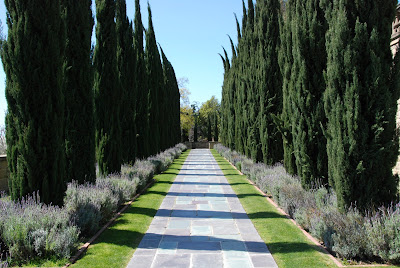 (Christmas 2008)
(Christmas 2008)I hope your holiday season is filled with love, laughter and joy. Thank you so much for visiting my sometimes neglected blog. I'm so grateful to each and every one of you.
I will post later from another Hemisphere.
xx



I wanted to find the origin of the saying..."This too shall pass" which is commonly engraved on silver rings and comes from Jewish wisdom folktale.
One day Solomon decided to humble Benaiah Ben Yehoyada, his most trusted minister. He said to him, "Benaiah, there is a certain ring that I want you to bring to me. I wish to wear it for Sukkot which gives you six months to find it." "If it exists anywhere on earth, your majesty," replied Benaiah, "I will find it and bring it to you, but what makes the ring so special?" "It has magic powers," answered the king. "If a happy man looks at it, he becomes sad, and if a sad man looks at it, he becomes happy." Solomon knew that no such ring existed in the world, but he wished to give his minister a little taste of humility. Spring passed and then summer, and still Benaiah had no idea where he could find the ring. On the night before Sukkot, he decided to take a walk in one of the poorest quarters of Jerusalem. He passed by a merchant who had begun to set out the day's wares on a shabby carpet. "Have you by any chance heard of a magic ring that makes the happy wearer forget his joy and the broken-hearted wearer forget his sorrows?" asked Benaiah. He watched the grandfather take a plain gold ring from his carpet and engrave something on it. When Benaiah read the words on the ring, his face broke out in a wide smile. That night the entire city welcomed in the holiday of Sukkot with great festivity. "Well, my friend," said Solomon, "have you found what I sent you after?" All the ministers laughed and Solomon himself smiled. To everyone's surprise, Benaiah held up a small gold ring and declared, "Here it is, your majesty!" As soon as Solomon read the inscription, the smile vanished from his face. The jeweler had written three Hebrew letters on the gold band: gimel, zayin, yud, which began the words "Gam zeh ya'avor" -- "This too shall pass." At that moment Solomon realized that all his wisdom and fabulous wealth and tremendous power were but fleeting things, for one day he would be nothing but dust.
Heda Jason recorded this version told by David Franko from Turkey: via Wikipedia

My work is loving the world.
Here the sunflowers, there the hummingbird
equal seekers of sweetness.
Here the quickening yeast; there the blue plums.
Here the clam deep in the speckled sand.
Are my boots old? Is my coat torn?
Am I no longer young, and still not half-perfect? Let me
keep my mind on what matters,
which is my work,
which is mostly standing still and learning to be
astonished.
The phoebe, the delphinium.
The sheep in the pasture, and the pasture.
Which is mostly rejoicing, since all the ingredients are here,
which is gratitude, to be given a mind and a heart
and these body-clothes,
a mouth with which to give shouts of joy
to the moth and the wren, to the sleepy dug-up clam,
telling them all, over and over, how it is
that we live forever.
~ Mary Oliver







 I'm off to SXSW in Austin, Texas for the week. Was going to go on a tour bus but realized that I would need a little more space than a shoe box to bring what's needed to prepare myself for a week of insanity.
I'm off to SXSW in Austin, Texas for the week. Was going to go on a tour bus but realized that I would need a little more space than a shoe box to bring what's needed to prepare myself for a week of insanity. 


 Blinds from Artylicious. Great idea if the view is a dreary wall or you have nosy neighbours!
Blinds from Artylicious. Great idea if the view is a dreary wall or you have nosy neighbours!



 Jean Badovici lived in the house until his death in 1956. The house was then put up for auction and bought by a friend of Le Corbusier. The house has had two other owners. The second of which sold many of the villa's original contents to fund badly needed repair work, which unfortunately never got underway.
Jean Badovici lived in the house until his death in 1956. The house was then put up for auction and bought by a friend of Le Corbusier. The house has had two other owners. The second of which sold many of the villa's original contents to fund badly needed repair work, which unfortunately never got underway. 

 This was a bushy, healthy plant yesterday.
This was a bushy, healthy plant yesterday.  For me, its the free-flowing, open plan feeling. Rooms full of inspiration. Slightly industrial but warm and inviting, at the same time.
For me, its the free-flowing, open plan feeling. Rooms full of inspiration. Slightly industrial but warm and inviting, at the same time.



